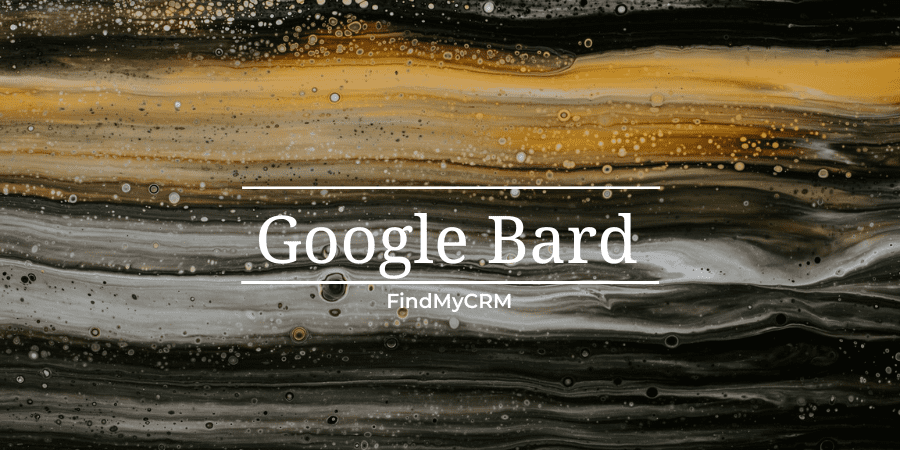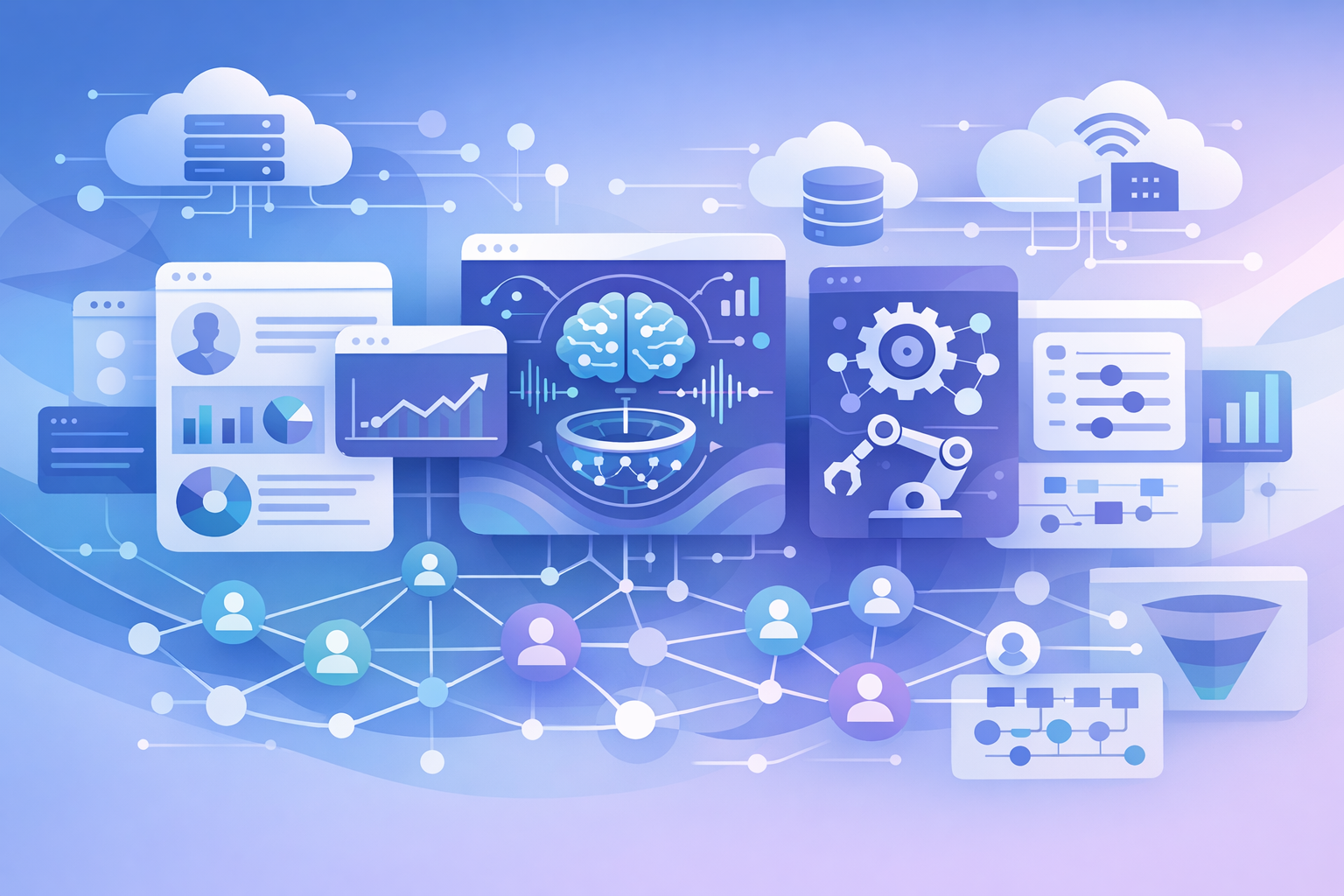Almost simultaneously with the introduction of the AI-based chatbot ChatGPT by OpenAI, global tech giants such as Microsoft and Google got into the game.
We would like to remind you that in previous articles, we reviewed the top CRMs for small businesses:
What is Google Bard?
Following the success of OpenAI's ChatGPT, Google has released its own AI chatbot. Here is what you need to know about the new AI.
Bard is an experimental conversational chatbot with artificial intelligence from Google.
The IT giant stated that Bard will work separately from the Google search engine. The chatbot will generate answers only in English, not in the form of computer code or other languages, and will provide access on a first-come, first-served basis for the time being.
It is supposed to function similarly to ChatGPT, with the only difference being that Google's service will take information from the Internet.

When was Google Bard announced?
Bard was introduced on February 6 in a statement by Google and Alphabet CEO Sundar Pichai. Despite the fact that Bard was a completely new concept at the time of its announcement, the AI chat service is based on Google's Language Model for Dialog Applications (LaMDA), which was introduced two years ago.
[Related Article: CRM Reporting]
How does Google Bard work?
We have learned what Google Bard is, but how does it work? LaMDA is built on Transformer, Google's neural network architecture that the company invented and made publicly available in 2017. Interestingly, GPT-3, the language model on which ChatGPT runs, was also built on Transformer.
And one more thing: Google's Bard is based on the controversial LaMDA bot.
The initial version of Bard will use a lightweight LaMDA model because it requires less computing power and can be scaled to more users, the release says. In addition to LaMDA, Bard will use all information from the Internet to provide answers. Pichai said that getting information from the Internet will provide "fresh, high-quality answers."
The use of LaMDA is in stark contrast to most artificial intelligence chatbots, including ChatGPT and Bing Chat, which use GPT series LLMs.

Who has access to Google Bard?
Google opened its Bard waitlist on March 21, 2023. The waitlist will provide access to a limited number of users in the US and UK on a rolling basis. Google will collect the first user feedback to continue improving the AI chatbot.
How to get on the Google Bard waiting list?
To get on the Bard waitlist, all you have to do is go to the homepage, sign in with your Google account, accept the terms and conditions, and you're done.
[Related Article: 15+ SaaS Product Ideas]
Why did Google decide to introduce Google Bard now?
ChatGPT has been a hit since its launch. Less than a week after its launch, ChatGPT had more than a million users. According to an analysis by the Swiss bank UBS, ChatGPT is the fastest growing app of all time. Due to this success, other tech companies, including Google, are trying to enter this market while it is still hot.
In the same week that Google introduced Bard, Microsoft introduced a new AI-powered search engine, Bing, which is powered by the next-generation OpenAI language model adapted specifically for search.
In addition, Google has developed an AI image generator called Imagen, which could be a great alternative to OpenAI's DALL-E when it is released. Google also has an AI music generator called MusicLM, which, according to Google, is not yet planned for release.

Main differences between Google Bard and ChatGPT
Will Douglas Heaven is the managing editor of AI at MIT Technology Review. He attended a live demonstration of Bard at Google's London office and shared his impressions.
Below are a few highlights from his article about Bard, including the features and user experience.
Less "toxicity"
Bard is based on a new version of LaMDA, Google's leading large-scale language model (LLM). Similar to ChatGPT and GPT-4, Bard's training is reinforced by human feedback. This approach makes chatbot responses more relevant and less "toxic". Google promises that Bard will be updated as LaMDA develops.
Bard is a creative collaborator, not just a search bot
At a demonstration in London, Bard sketched out ideas for a children's birthday party (rabbits were the theme) and generated several life hacks for caring for indoor plants.
Google emphasizes that they see Bard as a creative collaborator, not an alternative to the search engine.
Bard is a supplement, not a replacement for Google
Google wants users to consider Bard as a complement to Google Search, not a replacement. There is a Google It button below the Bard chat widget that should prompt users to go to search and check information from AI or find additional information. In this way, developers hope to compensate for the limitations of the technology.
Limited number of queries
Users will have only a limited number of attempts to interact with the chatbot during one session.
Heaven attributes this to the fact that the longer a chat with AI lasts, the more likely it is that the latter will lose its "mind".
Restricted topics
Google has also taken precautions when it comes to content. Users cannot submit sexually explicit queries, illegal, harmful, or dangerous materials, or personal data to Bard.
Three answer options
The most noticeable difference between Bard and ChatGPT is that the former generates three answers to each query, which are called drafts or drafts. The user can choose the best option, or combine their individual parts with each other.
The goal is to give the user a sense of control and remind them that AI cannot generate the perfect answer.
As Google emphasizes, providing a single answer creates a "sense of authority," while generative AI has problems with factual accuracy.
[Related Article: What is the future of CRM?]
Conclusions
Google constantly emphasizes that it has no plans to replace traditional online search with language models, as it has spent decades improving the search experience of users. However, as Heaven notes, this may indicate Bard's limitations rather than a long-term strategy.
After all, very soon Google may find itself in an "arms race" with OpenAI, Microsoft, and other competitors who will offer their own artificial intelligence models.
And if ChatGPT is already integrated into Bing and other Microsoft products, Google will eventually be forced to do the same - even if the technology is still lame.
The idea of multiple drafts per query looks very interesting, but limiting the number of queries in one session may be a problem in practical tasks. So we are looking forward to the full release to test it ourselves. To learn more about modern technologies, read our blog, there are a lot of interesting things here!




